Electrolytes are vital minerals that are transported in our bodies in the form of electrically charged ions. These substances are essential for the normal functioning of the body – from transmitting nerve impulses to ensuring muscle activity. Proper electrolyte balance is a key factor in maintaining optimal health, proper hydration, and physical performance. Whether you are a professional athlete, an active mother, or just taking care of your health, electrolytes play a vital role in your daily well-being.
In this comprehensive article, you will learn about the main types of electrolytes, their functions in the body, how to recognize signs of their imbalance, which foods you can replenish their reserves with, and when it is worth considering supplements. We will also discuss practical recommendations on how to maintain optimal electrolyte balance in everyday life.
The concept of electrolytes – definition and their role in the body
Electrolytes are minerals that, when dissolved in body fluids (blood, lymph, cell fluids), break down into electrically charged ions. These ions create an electrical potential that is necessary for many vital functions. The main electrolytes in our body are sodium, potassium, calcium, magnesium, chloride, phosphate and bicarbonate.
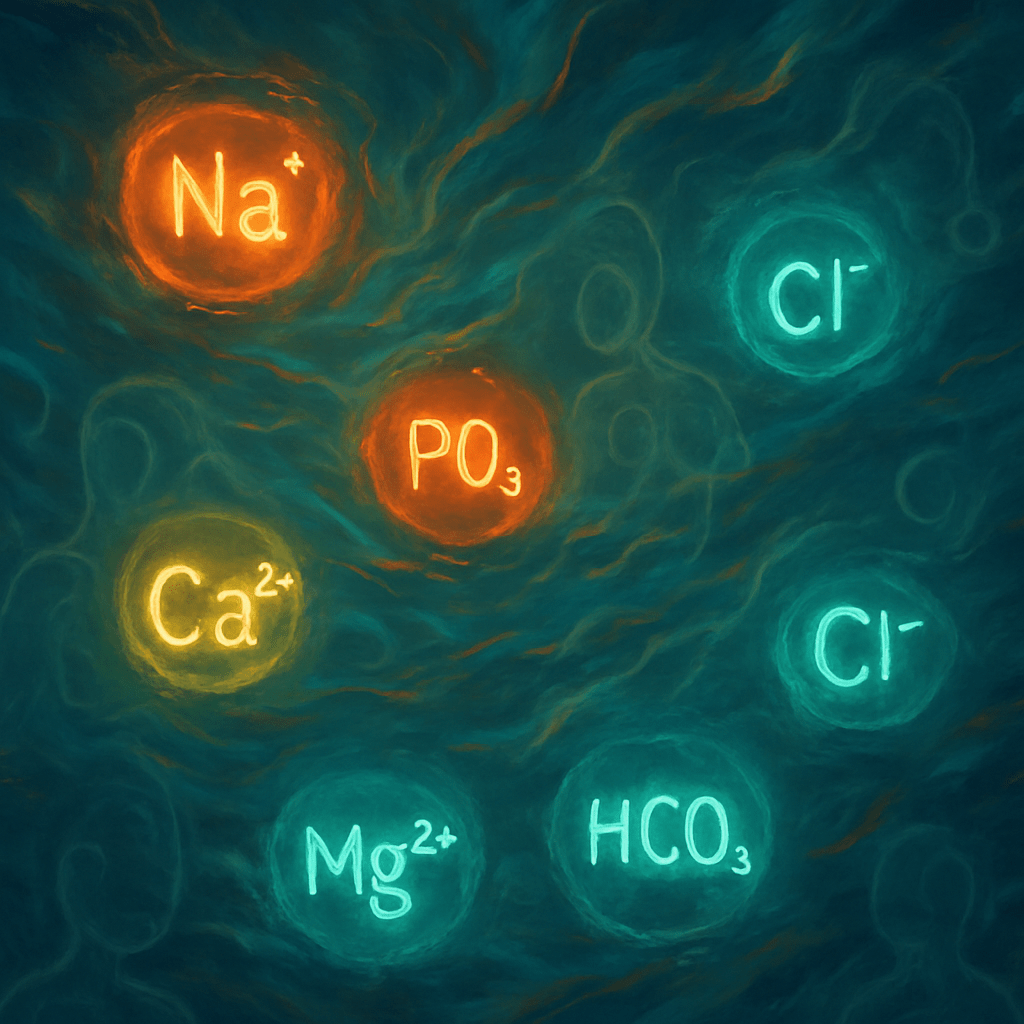
Sodium (Na+) is the main electrolyte in the extracellular fluid, regulating the amount of water in the body and helping to maintain blood pressure. It is also necessary for the transmission of nerve impulses and muscle contraction.
Potassium (K+) acts in the opposite direction to sodium – it is the main internal electrolyte of cells, involved in the regulation of heart rate, muscle contraction and the transmission of nerve signals. An imbalance of potassium can cause serious heart rhythm disorders.
Calcium (Ca2+) not only strengthens bones and teeth, but also participates in muscle contraction, blood clotting and the transmission of nerve signals. It also acts as a secondary mediator inside cells.
Magnesium (Mg2+) activates more than 300 enzymes, regulates body temperature, is involved in energy production and helps maintain normal nerve and muscle function.
Chloride (Cl-) is usually found together with sodium and is necessary for the production of stomach acids, and also helps maintain proper fluid balance and acid-base balance in the body.
Phosphate (HPO42-) is essential for bone and tooth formation, energy production (in the ATP molecule), and the structure of genetic material (DNA, RNA).
Bicarbonate (HCO3-) acts as a buffering agent, helping to maintain the body’s pH balance by neutralizing acids.
All of these electrolytes work together in a complex system of balance. Their concentrations in the blood and other body fluids are tightly controlled, and any deviations can lead to health problems.
Why are electrolytes so important? – basic functions and health benefits
Electrolytes are indispensable for the functioning of our body and perform a number of vital functions that cannot be overestimated. Here are the main functions of these minerals:
- Nerve impulse transmission: Electrolytes create electrical gradients necessary for the transmission of nerve impulses. Without the right amount of electrolytes, our nervous system would not be able to transmit signals effectively, which would lead to impaired sensation and movement.
- Muscle contraction: Calcium, sodium and potassium ions are directly involved in the mechanism of muscle contraction. The heart, being a muscular organ, is particularly dependent on the correct balance of electrolytes – even the slightest deviations can cause heart rhythm disorders.
- Fluid balance: Electrolytes regulate the movement of water between different compartments of the body, maintaining proper hydration in cells, tissues and blood. This process occurs according to the osmotic pressure created by electrolytes.
- pH regulation: Electrolytes act as buffers that help maintain the correct acid-base balance in the body. This function prevents dangerous pH fluctuations that could disrupt enzyme activity and other biochemical reactions.
- Nutrient transport: Electrolytes participate in active transport mechanisms, helping cells absorb glucose, amino acids, and other important substances
The Role of Electrolytes in Physical Activity
Electrolytes play a crucial role in ensuring optimal physical performance.
.
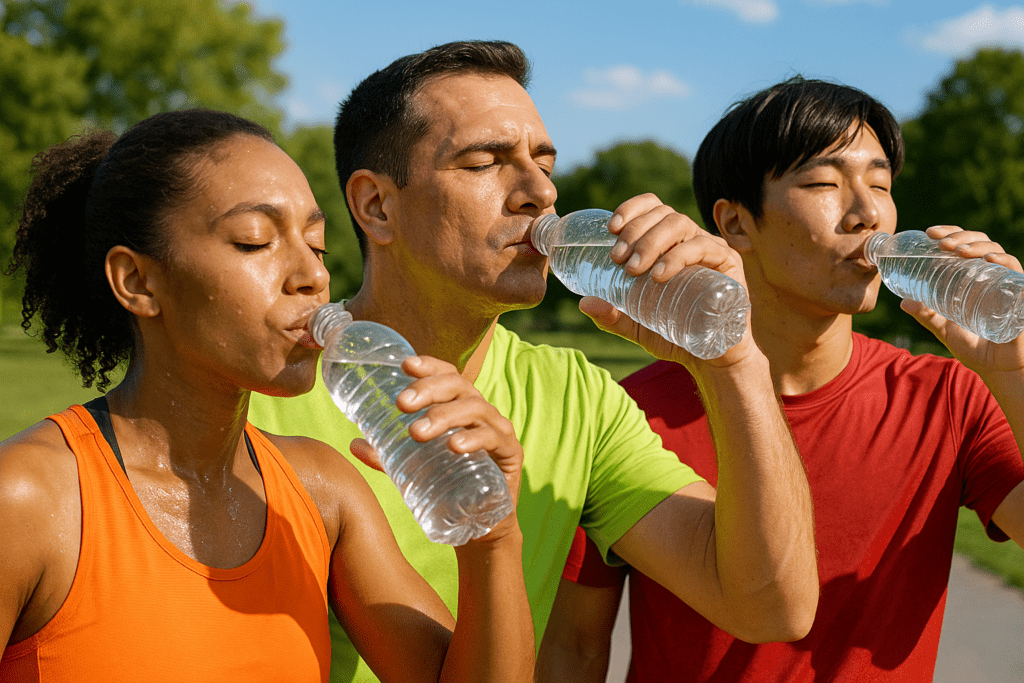
During intense physical activity, sweat not only loses water, but also large amounts of electrolytes, especially sodium and potassium. This loss can lead to muscle cramps, fatigue and reduced physical performance.
If electrolytes are insufficient, dizziness, nausea or even loss of consciousness may occur during exercise. Therefore, adequate electrolyte supplementation before, during and after intense physical activity is necessary to maintain optimal body functioning and avoid the consequences of dehydration and electrolyte imbalance.
Athletes, especially endurance athletes, often use specially balanced drinks with electrolytes to maintain proper hydration and balance in the body during long training or competitions. These special drinks not only replenish lost electrolyte reserves, but also help to restore strength faster after physical exertion.
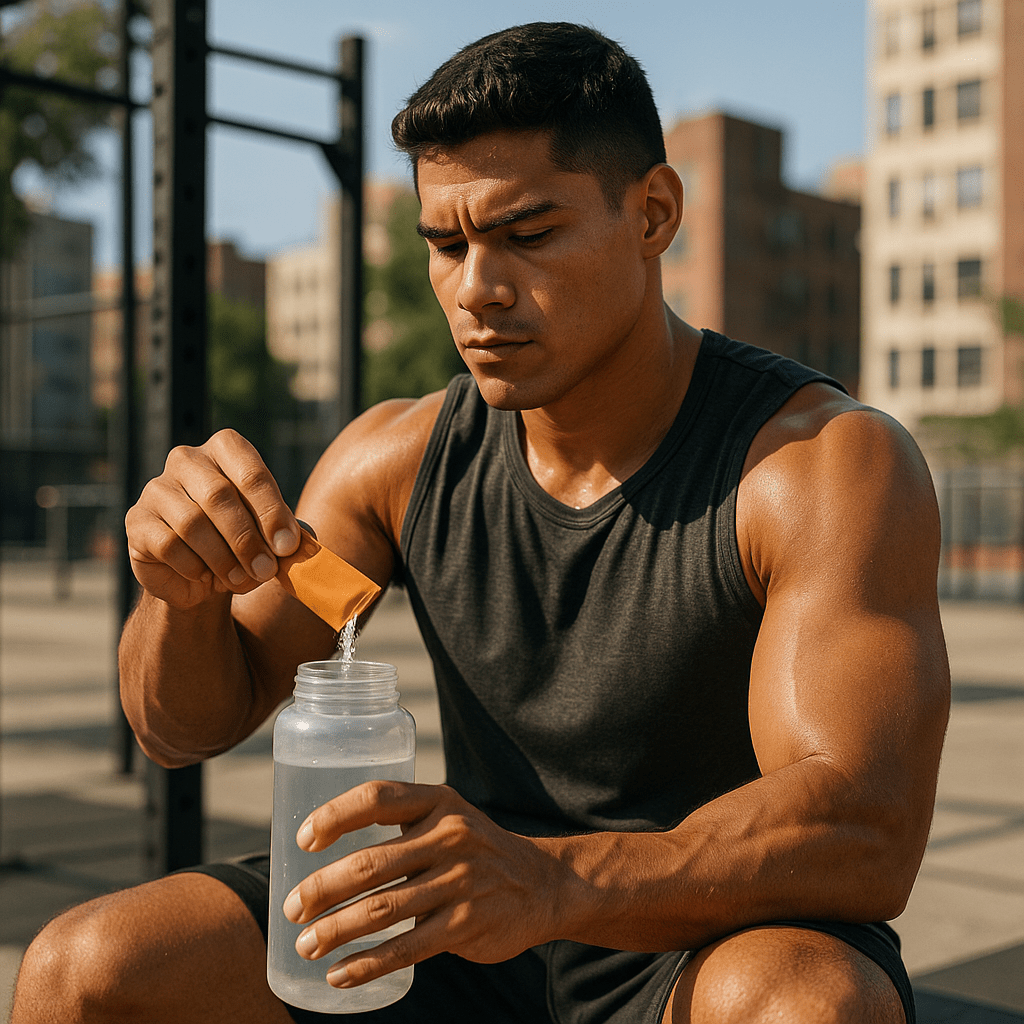
Causes of Electrolyte Imbalance – Risk Factors and Symptoms
Electrolyte imbalances can occur for a variety of reasons that result in either too little or too much of these important substances in the body. The main risk factors are:
- Dehydration: This is one of the most common causes of electrolyte imbalances. It can occur due to intense physical exercise, heat, insufficient fluid intake, fever, or being in a very hot environment. Sweating leads to the loss of not only water, but also electrolytes.
- Nutritional deficiencies: Poor nutrition, avoidance of foods containing electrolytes, or eating disorders can lead to electrolyte deficiencies. Vegetarians and vegans should pay special attention to sources of calcium, magnesium, and iron in their diets.
- Digestive system problems: Prolonged vomiting, diarrhea, or malabsorption syndrome can cause significant loss of electrolytes through the digestive tract. Disorders such as Crohn’s disease, celiac disease, or inflammatory bowel disease can interfere with the absorption of electrolytes.
- Medications: Some medications, especially diuretics, heart and blood pressure medications, can disrupt electrolyte balance by causing increased excretion of electrolytes in the urine.
- Kidney disease: Since the kidneys are responsible for regulating electrolytes in the body, any impairment in kidney function can lead to electrolyte imbalances. Chronic kidney disease is one of the most common causes of electrolyte imbalances.
- Endocrine disorders: Certain conditions, such as diabetes, adrenal gland or thyroid disorders, can affect the concentration of electrolytes in the body.
Symptoms of electrolyte imbalances can be subtle or pronounced, depending on the degree and duration of the imbalance. The most common symptoms are:
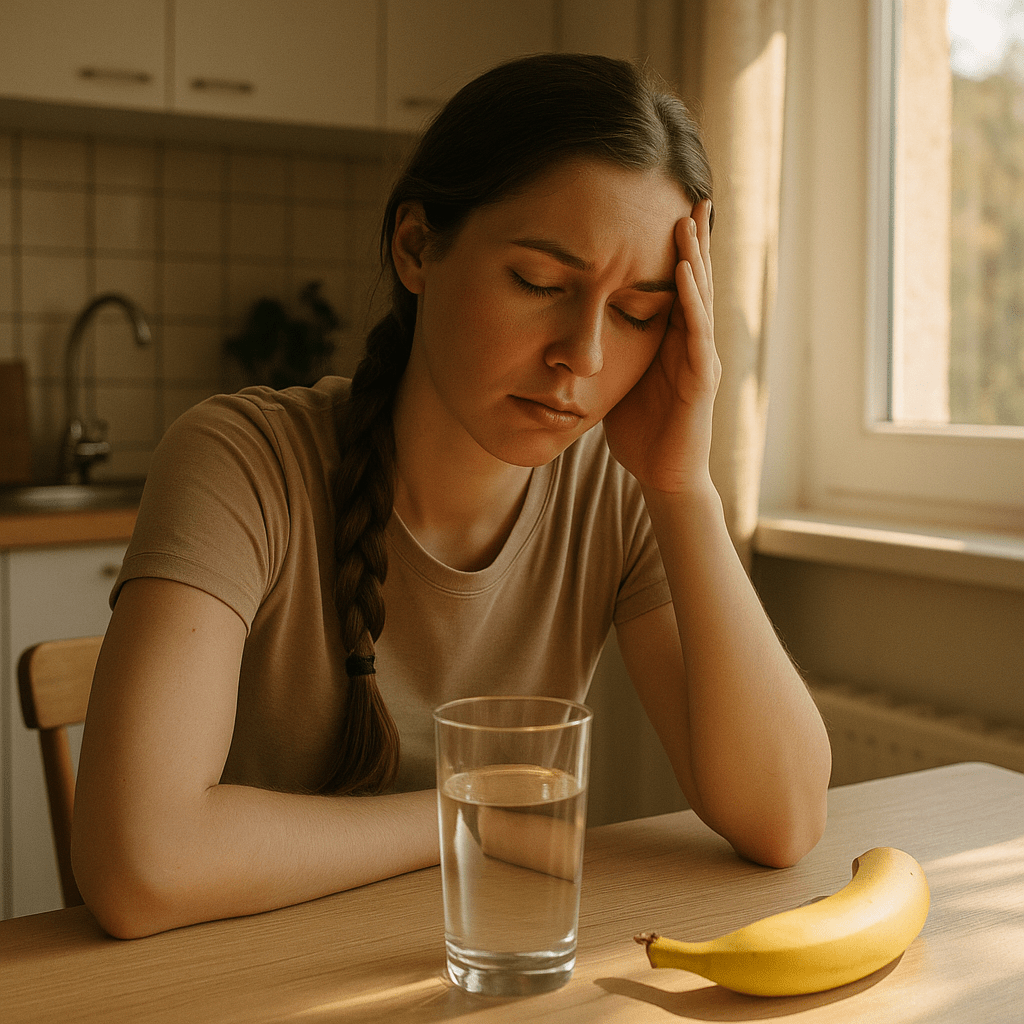
- Muscle problems: Cramps, weakness, tremors, or twitching
- Fatigue and weakness: Unusually severe and persistent fatigue
- Heart rhythm disorders: Irregular heartbeat, feeling of your heart pounding
- Nervous system symptoms: Dizziness, confusion, irritability, seizures
- Digestive problems: Nausea, vomiting, loss of appetite
- Blood pressure changes: Low blood pressure, fainting
Signs of low and high electrolyte levels
Different electrolyte imbalances cause different symptoms. Here are the main signs:
- Signs of low sodium (hyponatremia): headache, confusion, fatigue, nausea, muscle cramps, seizures, impaired consciousness.
- Signs of high sodium (hypernatremia): thirst, decreased urine output, restlessness, irritability, muscle stiffness.
- Signs of low potassium (hypokalemia): muscle weakness, cramps, constipation, heart rhythm disturbances.
- Signs of high potassium (hyperkalemia): muscle weakness, numbness and tingling, heart rhythm disturbances that can be life-threatening.
- Signs of low calcium (hypocalcemia): muscle cramps, muscle spasms in the hands and feet, paresthesias around the mouth, seizures.
- Signs of high calcium levels (hypercalcemia): fatigue, weakness, bone pain, increased urination, constipation.
- Signs of low magnesium levels (hypomagnesemia): tremors, muscle cramps, personality changes, abnormal heart rhythm.
It is important to note that serious cases of electrolyte imbalance can be life-threatening and require immediate medical attention.
Food Sources of Electrolytes – How to Get Enough Through Diet
A balanced diet is the best way to ensure that your body gets enough electrolytes. Different foods are rich in different electrolytes.
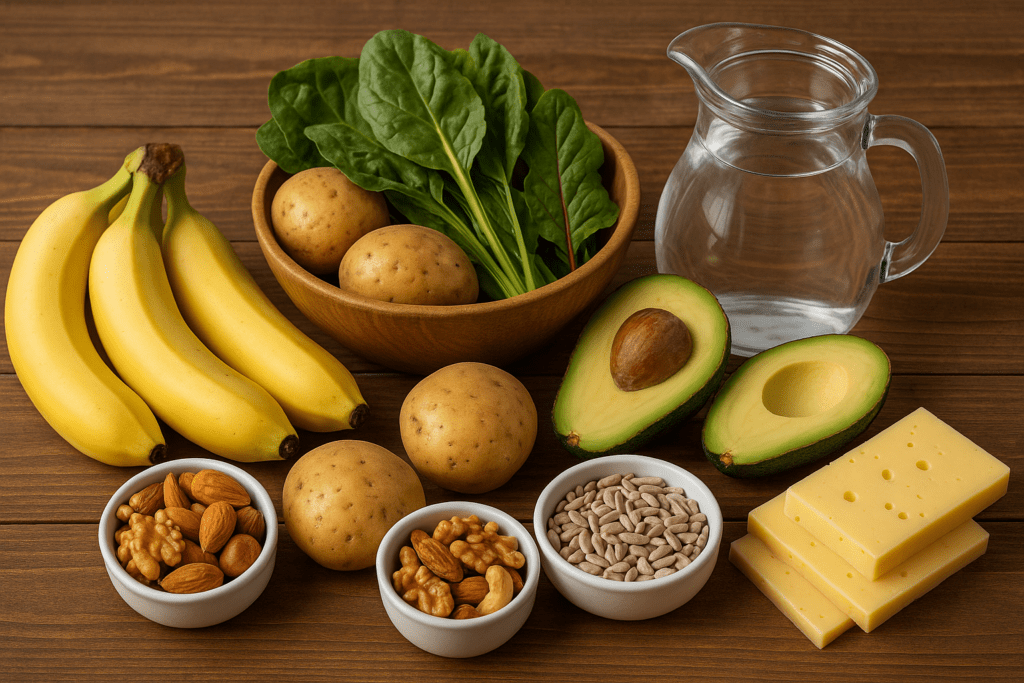
In order to maintain a healthy electrolyte balance, it is worth knowing their main sources and including them in your daily diet.
Sodium sources
Although there is often talk about the need to reduce sodium intake, this electrolyte is essential for the normal functioning of the body. The recommended daily intake for adults is about 1500-2300 mg of sodium (about 6 g of table salt).
- Table salt is the main source of sodium in our diet
- Canned foods
- Olives and their oil
- Pickles (cucumbers, cabbage)
- Cheese and dairy products
- Seafood
Potassium sources
It is recommended that an adult consume 3500-4700 mg of potassium per day. This electrolyte, together with sodium, helps maintain fluid balance and blood pressure.
- Bananas are one of the most popular sources of potassium
- Potatoes – especially with the skin
- Green leafy vegetables (spinach, kale)
- Apricots and dried fruits
- Avocados
- Legumes (beans, lentils, peas)
- Nuts and seeds
Sources of calcium
The recommended daily intake of calcium for adults is 1000-1200 mg. This mineral is essential not only for bone health, but also for muscle contraction and nerve signal transmission.
- Dairy products (milk, yogurt, cheese)
- Calcium-fortified plant-based beverages (soy, almond milk)
- Leafy green vegetables (broccoli, mustard greens)
- Tofu (especially those made with calcium sulfate)
- Almonds and sesame seeds
- Sardines and salmon with bones
Magnesium sources
Adult men are recommended to consume 400-420 mg of magnesium per day, and women – 310-320 mg. This electrolyte is involved in more than 300 biochemical reactions in the body.
- Nuts (almonds, cashews, peanuts)
- Seeds (pumpkin, sunflower)
- Whole grains
- Spinach and other leafy greens
- Dark chocolate (high in cocoa)
- Legumes
- Avocados
Chloride sources
Chloride is most often found with sodium, so its sources are very similar:
- Table salt (sodium chloride)
- Seaweed
- Seafood
- Tomatoes
- Celery
- Olives
Sources of phosphorus
The recommended daily intake for adults is about 700 mg of phosphorus. This electrolyte is important for bone and tooth formation and energy production.
- Meat, poultry and fish
- Dairy
- Eggs
- Nuts and seeds
- Beans and lentils
- Whole grains
Including a variety of foods in your daily diet is the best way to ensure adequate levels of all electrolytes. A healthy, balanced diet rich in fruits, vegetables, whole grains, lean meats and dairy products usually provides adequate electrolytes for healthy people.

Should You Take Electrolyte Supplements or Sports Drinks?
While electrolytes are naturally found in foods and drinks, there are times when you may need to take additional sources. Electrolyte supplements and sports drinks can be helpful, but it’s important to know when you really need them and when you’re better off relying on natural sources.
What are electrolyte drinks?
Electrolyte drinks are specially formulated liquids that contain water, electrolytes (most commonly sodium, potassium, calcium, and magnesium), and carbohydrates (sugars). These drinks are designed to quickly replenish lost fluids and electrolytes, especially after intense exercise.
There are various types of electrolyte drinks available on the market:
- Sports drinks (e.g. Gatorade, Powerade) – these usually contain electrolytes and sugar for quick energy recovery.
- Electrolyte powders and tablets – designed to be dissolved in water; often contain less sugar than traditional sports drinks.
- Coconut water – a natural drink that contains electrolytes, especially potassium.
- Specialized medical rehydration solutions – for example, for children or patients with diarrhea.
Who should actually take electrolyte supplements?
Electrolyte supplements are not always beneficial for everyone. Here are some situations where they may be recommended:
- Endurance athletes – people who exercise for more than an hour, especially in hot environments, can lose a large amount of electrolytes through sweat.
- Individuals who have experienced significant rehydration – after severe diarrhea, vomiting, or high fever.
- Individuals who do heavy physical work in hot environments – construction workers, farmers, rescue workers, etc.
- Individuals with certain medical conditions – that cause electrolyte imbalances (such as certain kidney diseases, endocrine disorders).
- Travelers to hot climates – especially those who are not acclimated to such climates.
Disadvantages and Risks of Electrolyte Supplements
While electrolyte supplements may be beneficial in some cases, it is important to be aware of the potential risks:
- Additional sugar intake – Many sports drinks contain high amounts of sugar, which can contribute to weight gain and other health problems.
- Risk of electrolyte imbalance – Too much of certain electrolytes can be just as dangerous as too little. For example, hypernatremia (too much sodium) can cause dangerous symptoms.
- Artificial additives – Many electrolyte drinks contain artificial sweeteners, colorings, and preservatives, which may cause allergic reactions in some people.
- Hyponatremia due to excessive water intake – Too much water combined with electrolyte supplements can “dilute” the sodium concentration in the blood, leading to a dangerous condition.
It is important to note that for most people engaged in moderate-intensity activity, water alone and a balanced diet are usually sufficient to maintain proper electrolyte balance.
Supplements vs. Natural Sources
In most cases, natural sources of electrolytes (food and beverages) are superior to supplements in the following ways:
- Natural sources provide electrolytes in optimal ratios
- Electrolytes in food are often better absorbed
- Natural sources also provide other nutrients and fiber
- Lower risk of overconsumption
If you do decide to take electrolyte supplements, it is recommended that you consult a healthcare professional, especially if you have a chronic condition or are taking medications that may affect electrolyte balance.

How to Maintain Electrolyte Balance – Practical Tips for Everyday Health
Proper electrolyte balance is an essential part of overall health and well-being.
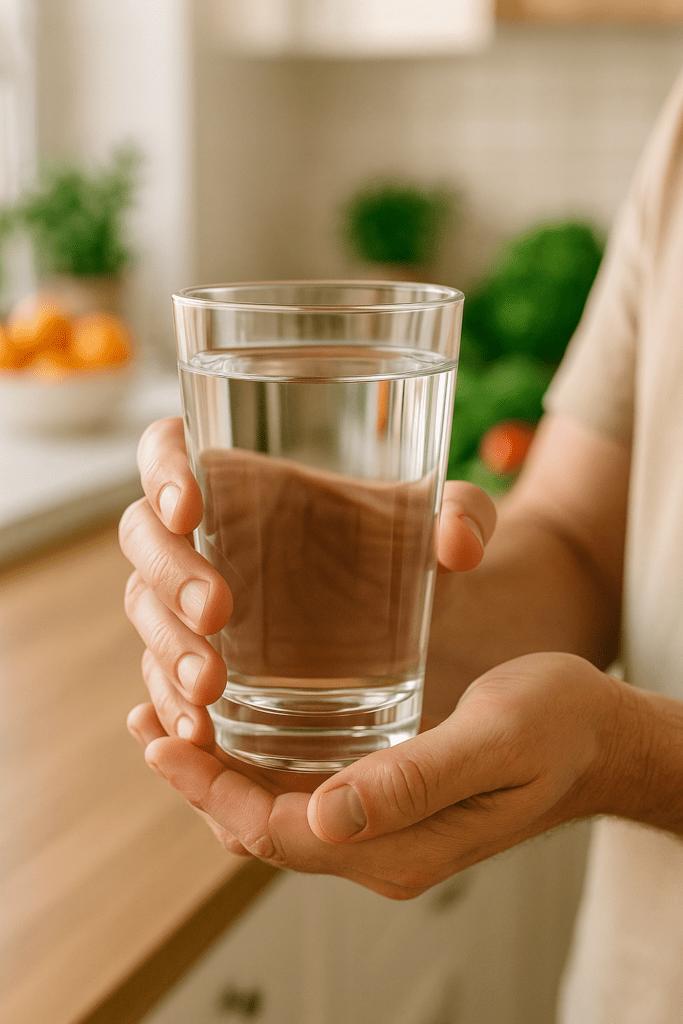
Fortunately, for the vast majority of people, a few simple daily habits are enough to maintain optimal electrolyte levels. Here are some practical tips to ensure a healthy electrolyte balance:
Ensuring optimal hydration
- Drink water regularly – aim to consume about 30-35 ml of water per kilogram of body weight per day. This means that a 70 kg person should drink about 2-2.5 liters of water.
- Monitor the color of your urine – a light yellow color usually indicates adequate hydration.
- Adjust your water intake according to physical activity, air temperature and health status.
- Avoid signs of dehydration – thirst, dry mouth, headache, dark urine.
Principles of a balanced diet
- Include a variety of foods, especially those rich in electrolytes – fruits, vegetables, whole grains, nuts and seeds.
- Limit your intake of processed foods, as they are often high in sodium and low in other important electrolytes.
- Eat enough fruits and vegetables – aim for 5 servings per day, as these are rich in potassium and other electrolytes.
- Include healthy sources of fat, such as avocados, nuts and olive oil, which also contain electrolytes.
Specific recommendations for physical activity
- Before intense physical activity – ensure good hydration levels by drinking 400-600 ml of water 2-3 hours before exercise.
- During exercise – drink approximately 150-350 ml of water every 15-20 minutes, depending on the amount of sweat and the ambient temperature.
- During exercise lasting longer than an hour – consider consuming electrolyte drinks, especially if you are sweating heavily.
- After exercise – consume a food or drink containing electrolytes within 30 minutes of physical activity (e.g. banana, coconut water).
Preventing Electrolyte Imbalances in Special Circumstances
- On hot days – increase your intake of fluids and electrolyte-rich foods.
- During illness – if you have diarrhea or vomiting, drink rehydration solutions that contain electrolytes.
- When traveling to hot climates – acclimatize gradually and ensure adequate hydration.
- During pregnancy – consult your doctor about your specific electrolyte needs.
When to see a doctor
While in most cases, proper electrolyte balance can be maintained through a healthy lifestyle, there are certain situations where you should see a doctor:
- When symptoms of electrolyte imbalance persist despite proper nutrition and hydration
- When serious symptoms occur: severe heart rhythm disturbances, seizures, severe muscle weakness
- If you have chronic conditions such as kidney disease, heart failure, or diabetes
- If you are taking medications that can affect electrolyte balance (diuretics, some antibiotics, etc.)
- After a prolonged and severe episode of diarrhea or vomiting, especially in children and the elderly
Maintaining proper electrolyte balance is not a one-time task, but a lifestyle. By incorporating these simple tips into your daily life, you can ensure optimal electrolyte balance and improve your overall well-being and health.
Frequently Asked Questions (FAQ)
What are the main functions of electrolytes in our body?
Electrolytes regulate fluid balance in the body, ensure nerve and muscle function, maintain pH balance and support target organs such as the heart and brain.
What are the early signs of electrolyte deficiency?
The most common early symptoms of electrolyte deficiency are fatigue, muscle cramps, headache, irregular heartbeat, confusion or dizziness.
When should electrolyte supplements be taken instead of water?
Electrolyte supplements may be useful during intense exercise (longer than an hour), in case of heavy sweating, after an illness that causes vomiting or diarrhea, or when recommended by a doctor for specific health conditions.
What foods are the richest in electrolytes?
Bananas, potatoes, dairy products, leafy green vegetables, nuts, seeds and table salt are the main sources of potassium, calcium, magnesium and sodium.
Can too much electrolytes be dangerous?
Yes, too much electrolytes, especially from supplements, can cause serious health problems, such as heart rhythm problems or kidney problems. The key is balance.
